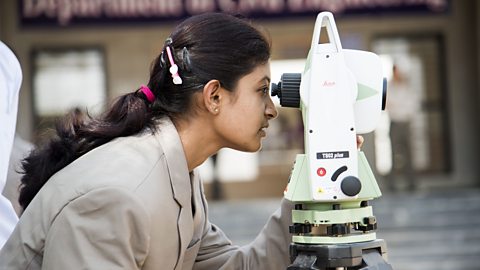There are two verbs for 'to be' in Spanish, ser and estar, and they are used in different ways.
The verb 'to be' in Spanish.
In Spanish, there are two verbs for тto beт: ser and estar and you use them for different things.
The verb ser goes like this:
soy - I am
eres - you are
es - he/she/it is
You can use it for describing people: soy alto (тIтm tallт) or es deportiva (тshe is sportyт).
You can also use ser if you're talking about where you or someone else is from.
ТПDe dУГnde eres? - Where are you from?
Soy de EspaУБa - Iтm from Spain.
And to talk about what you do: Soy estudiante - Iтm a student.
Mi padre es enfermero - My dad is a nurse.
Then thereтs estar, the other Spanish verb for тto beт.
estoy - I am
Б№ВѕГйУЁВѕ - you are
Б№ВѕГйУЁ - he/she/it is
You can use estar to talk about feelings:
How are you? - ТПCУГmo Б№ВѕГйУЁВѕ?
Estoy feliz - Iтm happy.
Or to talk about where people or things are located.
Estoy en Londres - Iтm in London.
Excuse me, where is the cinema? - Perdona, ТПdУГnde Б№ВѕГйУЁ el cine?
You can also use it to talk about the condition something or someone is in:
My phone is broken - Mi mУГvil Б№ВѕГйУЁ roto.
Those are the main differences between ser and estar so itтs great to know which one you need when!
To be: 'ser' in the present tense
The verb ser is used to indicate:
Nationality
- Soy inglУЉs - I am English (masculine).
- Soy espaУБola - I am Spanish (feminine).
Where you are from
- ТПDe dУГnde eres? - Where are you from?
- Soy de Inglaterra y soy inglesa - I am from England and I am English (feminine).
Professions
- Mi madre es mУЉdica - My mother is a doctor.
- Mi hermano es profesor - My brother is a teacher.
The date
- ТПQuУЉ dУa es hoy? - What is the date?
- Hoy es el treinta y uno de julio - Today is the 31st July.
The time
- ТПQuУЉ hora es? - What time is it?
- Son las once y media - It's half past eleven.
Characteristics of people or things
ТПCУГmo eres? - What do you look like?
Soy alta y llevo gafas - I am tall and I wear glasses.

The table below shows the different parts of ser for different people or things. Can you use them to give more information about yourself or someone or something you know?
| Spanish | English |
|---|---|
| soy | I am |
| eres | you are (s) |
| es | he/she/it is |
| somos | we are |
| sois | you are (pl) |
| son | they are |
'Ser' in the past tense
To talk about the past, the imperfect tense of the verb ser is very useful. It helps you describe what things were like or what they used to be like.
For example:
- La pelУcula era muy graciosa - The film was very funny.
- ТПQuУЉ deportes hacУas cuando eras mУЁs joven? - What sports did you do when you were younger?
- Cuando era mУЁs joven, jugaba al tenis - When I was younger, I used to play tennis.
This table gives the verb ser in the past tense for different people and things. Can you use the different forms of the verb to give more information about yourself, or someone or something you know?
| Spanish | English |
|---|---|
| era | I was/used to be УЈ |
| eras | you were/used to be (s) |
| era | he/she/it was/used to be |
| УЉАљВЙГОДЧВѕ | we were/used to be |
| erais | you were/used to be (pl) |
| eran | they were/used to be |
'Ser' in the future tense
Use the immediate future tense to say what someone or something is going to be like.
For example:
- La semana que viene voy a visitar Londres. Va a ser muy divertido - Next week I am going to visit London. It is going to be very fun.
- El programa va a ser bastante aburrido - The programme is going to be quite boring.
- Voy a ser mУЁs alto que mi padre - I am going to be taller than my father.
This table gives the verb ser in the future tense for different people and things.
Can you use the different forms of the verb to give more information about yourself, or someone or something you know?
| Spanish | English |
|---|---|
| voy a ser | I am going to be |
| vas a ser | you are going to be (s) |
| va a ser | he/she/it is going to be |
| vamos a ser | we am going to be |
| vais a ser | you are going to be (pl) |
| van a ser | they are going to be |
To be: 'Estar' in the present tense
The verb estar is used to indicate:
Where something is located
- ТПЖйУГВдЛхБ№ Б№ВѕГйУЁ el libro? - Where is the book?
- El libro Б№ВѕГйУЁ en la mesa - The book is on the table.
Feelings and emotions and saying how you are
- ТПCУГmo Б№ВѕГйУЁВѕ? - How are you?
- Estoy muy bien, gracias - I am very well, thank you.
The condition of someone or something
Mi hermana Б№ВѕГйУЁ enferma - My sister is ill.
El coche Б№ВѕГйУЁ roto - The car is broken.

This table gives the verb estar for different people and things. Can you use the different forms of the verb to give more information about yourself, or someone or something you know?
| Spanish | English |
|---|---|
| estoy | I am |
| Б№ВѕГйУЁВѕ | you are (s) |
| Б№ВѕГйУЁ | he/she/it is |
| estamos | we are |
| Б№ВѕГйУЁis | you are (pl) |
| Б№ВѕГйУЁn | they are |
'Estar' in the past tense
Use the imperfect tense of estar to describe what, how or where someone or something was.
For example:
- Estaba en la calle - I was in the street.
- Mi madre estaba contenta - My mother was happy.
This table gives the verb estar in the past tense for different people. Can you use the different forms of the verb to give more information about yourself, or someone or something you know?
| Spanish | English |
|---|---|
| estaba | I was/used to be |
| estabas | you were/used to be (s) |
| estaba | he/she/it was/used to be |
| Б№ВѕГйУЁbamos | we were/used to be |
| estabais | you were/used to be (pl) |
| estaban | you were/used to be |
'Estar' in the future tense
Use the immediate future tense of estar to say what or how someone or something is going to or will be.
For example:
- ТПVas a estar en casa mУЁs tarde? - Are you going to be at home later?
- ТПЖйУГВдЛхБ№ vas a estar a las tres? - Where are you going to be at three oТДclock?
- Voy a estar en la cafeterУa - I am going to be in the cafУЉ.
This table gives the verb estar in the future tense for different people. Can you use the different forms of the verb to give more information about yourself, or someone or something you know?
| Spanish | English |
|---|---|
| voy a estar | I am going to be |
| vas a estar | you are going to be (s) |
| va a estar | he/she/it is going to be |
| vamos a estar | we are going to be |
| vais a estar | you are going to be (pl) |
| van a estar | they are going to be |
Find out how much you know about the verb 'to be' in Spanish with this activity!
Quiz
Find out how much you know about the verb 'to be' in Spanish with this short quiz!
More on Grammar
Find out more by working through a topic